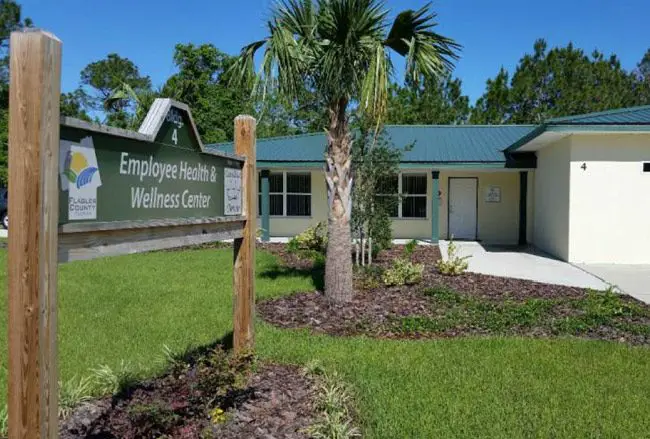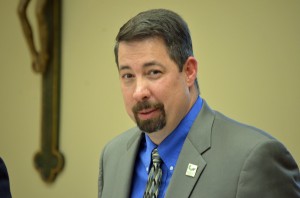
Last Updated: 3:08 p.m.
Flagler County government’s overview of next year’s budget was a good-news-bad-news sort of thing as County Administrator Craig Coffey analyzed the numbers for the county commission in a workshop this morning.
The better news is that property values are improving for the second year running. This year, taxable values are expected to rise 4.5 percent, generating $2.25 million more if the property tax rate remains the same.
But while the county could generate $2.25 million in additional revenue without raising the tax rate, it still faces $5 million in what Coffey calls “major budgetary challenges.” Those include a 2 percent cost of living raise for all employees ($1 million), necessary investments in information technology, equipment repairs and capital maintenance projects ($1.15 million), the need to rebuild the county’s reserves ($1 million), and a few other sundry costs.
Not so sundry is the inescapable increase in health costs. That’s the bad news. The county faces an increase in health insurance costs of $1.5 million. “We had a really bad year last year,” Coffey said, with 14 employees responsible for 29 percent of the costs of the entire system. “Cancer will still happen, bad things will still happen to good people,” Coffey said.
Commissioners have several options. They can absorb the entire cost increase. But that’s not likely. County government’s share of insurance premiums has been among the most generous among neighboring government agencies. Flagler pays over $700 of the premium share (whether it’s for a single employee or for employee and family or spouse), compared to $404 at the school board or $506 in Palm Coast government. So commissioners are looking at possibly increasing the share that employees pay. But they did not determine this morning what that share will be.
And they may find a way to keep individual employees’ costs relatively low. “I believe our obligation as far as health care is to our employee, not necessarily to their spouse or family,” Commissioner Barbara Revels said. In other words, it’s possible the county will choose to make coverage for spouses and families more expensive while limiting increases, as much as possible, on employees.
Still, that’s not certain, either. Premiums have been steady for six years, but they will have to change, Coffey said. “If there’s a shared burden there, the question is how do you share that burden and address other issues that we have to address as a county government,” Coffey said.
Unrelenting demands on county government make more spending all but certain.
“We should be looking out for our employees first,” Commissioner Frank Meeker said, noting that county employees’ salaries are already about 15 percent behind that of neighboring agencies’ salaries. Meeker wants to “balance a salary increase” with perhaps an increase in employee contributions. But commissioners will have to be careful not to negate the wage increase by matching it to a premium cost increase.
County taxpayers may look at county employee health costs and think: that doesn’t affect me. Not true: how the commission decides to pay for its health care will affect everything else in the coming budget. “These are major decisions that will shape how I will approach everything else.” Coffey said. Which means the final tax rate county residents will pay is predicated in part on how commissioners approach their health care costs.
But there are other reasons county residents at large have reason to be concerned about government employees’ pay and benefits, and how that affects the workforce.
“I’ve been crunching some of the numbers at the sheriff’s office in recent weeks,” Jon Dopp, vice president of the Coastal Florida Police Benevolent Association and a detective with the Flagler County Sheriff’s Office, told commissioners. “In the last three years we have a turnover rate of 39 percent. Some of these issues with salary and insurance, it can only work to compound those issues. Right now, about half of your sheriff’s office has less than three years of experience, so these are things that I think should be considered when these decisions are made.”
“Valuable information,” Revels said. (Revels had forgotten to open the floor to public comment at the end of the meeting, as is the habit of the commission. She had adjourned the meeting, was reminded, and reopened the session to take comments.)
Steve Palmer, president of the Flagler County Professional Firefighters union, echoed Dopp’s words and recalled speaking with a non-firefighter county employee to “advocate for the county employees who don’t have a voice. They actually do talk to me about stuff. I talked to one the other day that was one of the road and bridge–I don’t remember what division he works for–but he was telling me that with all the increases and stuff, he actually goes back in pay, from what he started off with five years ago.” The reason: insurance, pension contributions, and cost of living. “We are what makes the county function,” Palmer said, reminding commissioners that training employees just to lose them to better-paid work elsewhere is a loss–not just of experience, but of the county’s investment.
“You’re telling us the cost of doing business is going up,” Commissioner Nate McLaughlin had said to the county administrator earlier in the meeting.
Beyond county employee pay and benefits, commissioners must still plan for ongoing and new costs—theirs and that of the constitutional officers such as the supervisor of elections, the clerk of court, the tax collector and the sheriff. Most of the constitutionals have talked about not raising their budgets this year. “You’ll see from the funds there isn’t a ton of money to go around,” Coffey said.

Property values are rising, but even that must be kept in context. The county experienced a good increase last year, 7 percent, but it remains “a slow crawl-back” to pre-recession days,” Coffey said. “You won’t reach that for many, many years.” In actual numbers: taxable values in the county rose half a billion dollars this year, to $7 billion. But that’s still a long way from the $12.1 billion in taxable value in 2007.
If the property tax rate remains the same in next year’s budget, it would be considered a tax increase under Florida law, because the average property owner will see an increase in his or her tax bill. The current tax rate is $7.9417 per $1,000 in taxable value—that is, the typical $150,000 house with a $50,000 homestead exemption pays $794 in taxes for the year.
The full budget presentation, including all numbers discussed, is below.
![]()
Flagler County’s 2016-17 Budget Outlook.
Click to access 2016-05-10-Budget-Workshop-Power-Point.pdf






























Anonymous says
Maybe this has something to do with the fact that employees are encouraged to go to the clinic and the clinic has patients return 4-5-6 or more times for the same medial issue. I am sure Frank Meeker and his cancer treatments have substantial impact as well as near 80 year old County Commissioner Charlie Ericksen. Just like before, they will see who the ones rely on medical benefits and they will find a reason to force them out. I say the county should build their own hospital and let these geniuses start doing their own surgeries.
just me says
how can that be? was not 0bama care to REDUCE or at least the increase in the cost of insurance?
KB63 says
“Premiums have been steady for six years” So while the rest of the populations premiums have risen substantially (mine 50%) with less coverage & more out of pocket, these county employees premiums have stayed steady for six years. Sorry, can’t feel sorry for them. Time for the employees to pay more out of their pockets for their gold insurance with no need to raise everyone’s taxes. Just like the rest of us that got screwed with Obamacare.
IMHO says
Just my opinion but I believe it may be a privacy issue (HIPPA) for someone to state that “14 employees (are) responsible for 29 percent of the costs of the entire system.” Not a particularly big county . . . how many people (county employees or not) can figure out who these folks are? If not illegal/unethical, it is in really bad taste.
r&r says
I believe this is all caused by OBAMA MIS CARE.
Dave says
Flagler County government facing budgetary challenges is like saying , look the sun is coming up. Budgetary challenges are nothing more than poor planning and excessive Spending on projects that have no permanent pay back. I can see it now we the county need to tax the property owners to FIX Our Problem, since we the county management have failed at planning a budget and mismanaged the budget. I say its time for the voters to replace these county managers/administrators at election time. IF not it will be the same old, same old each and every year.
Glenn says
Under Hippa Laws I believe the county is NOT to know who has what medical treatment so how would thd county have such information? Since the county is self insured, are they provided diagnosis codes for treatments and the patients name to issue payment? If so, this should not be, this is an invasion of privacy and a violation of HIPPA Laws.Since Ericksen and Meeker’s medical events have been disclosed here on this blog site, how about sharing what the costs of their medical treatments have been. We tax payers employ these Commissioner’s and deserve to know, and need to know so we don’t elect such liabilities.
julian bergman says
I live on a fixed pension with increasing health ins. premiums every year. while I understand the burden of increased premiums they must pay their fair share. plus what about the additional revenue brought in from new construction which is never mentioned in setting the tax rate.